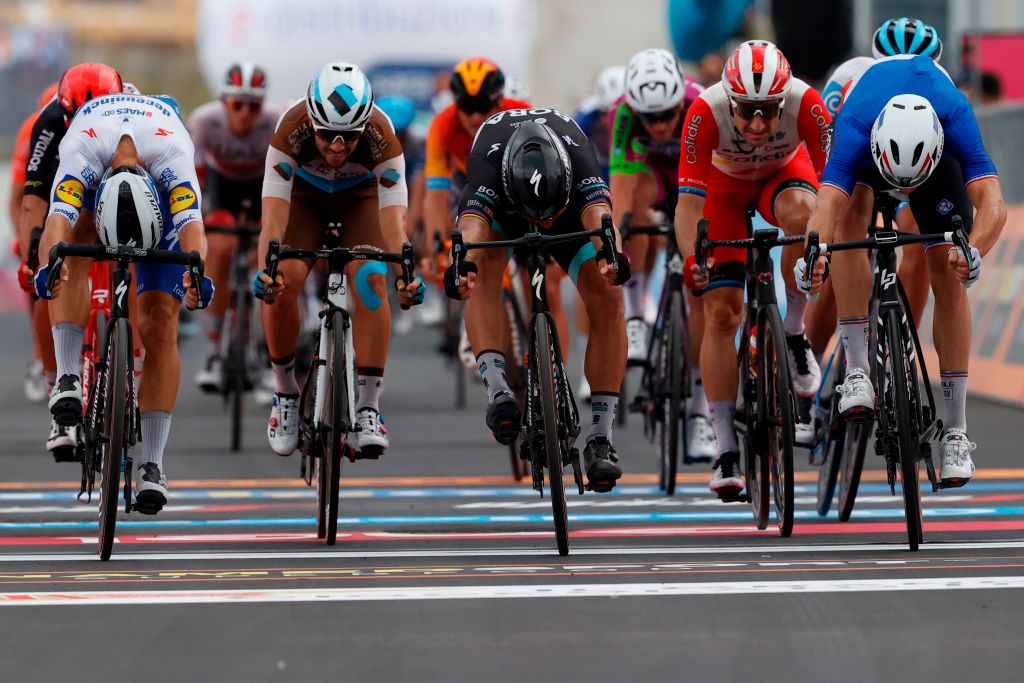Giro d'Italia: Luck on Démare’s side with last-second lunge for line
Frenchman takes 11th post-lockdown stage win

In the post-race press conference nobody asked stage 4 Giro d'Italia winner Arnaud Démare (Groupama-FDJ) if he was a Bob Dylan fan but after the events of Monday Dylan’s famous song line, “I can’t help it if I’m lucky,” surely rang true with the defending French national champion.
To a considerable extent, Démare made his own luck. He was strong enough to follow Bora-Hansgrohe’s charge when they went on the rampage over the mid-stage of Portella Mandrazzi climb, dropping Fernando Gaviria (UAE Team Emirates), and again by being well-positioned and in stunning sprint form for the final dash for the line in Villafranca Tirrena.
But as Démare himself confirmed afterwards, one of his biggest strokes of good fortune had been that in an ultra-tight sprint finish between himself, Peter Sagan (Bora-Hansgrohe) and Davide Ballerini (Deceuninck-QuickStep), it was only his last-second decision to throw his bike at the line that gave him his second Giro stage win in as many years.
“I didn’t know if I’d won,” Démare said. “I’d seen Ballerini celebrating with his teammates so I believed he had been informed via his radio that he was the winner. Until I got the call to go up the podium I didn’t know and I still wasn’t sure. Therefore, I couldn’t savour my victory as I would have normally done.”
The first Frenchman to win a stage of the Giro in the national champion’s jersey since Laurent Jalabert won three in 1999, Démare said that after the sprint he had the same impression as when he won narrowly in Paris-Nice, but had no idea it happened. Then, as it turned out “luck was with me.”
That wasn’t the only moment when fortune smiled on Démare on Monday, given he had to brake in the last five kilometres when a dog wandered into the road. Although there was no news about what happened to the unfortunate animal, Démare was lucky enough to stay upright and out of trouble.
“It was a very unusual finale, first because we wanted to keep Gaviria and [Elia] Viviani off the back as they were 25 to 30 seconds behind. Then we were told that Viviani had come across," said Démare.
Get The Leadout Newsletter
The latest race content, interviews, features, reviews and expert buying guides, direct to your inbox!
“After that, a dog crossed the road and made a U-turn. As I thought it was coming back towards the bunch, I braked hard and then had to accelerate hard to get back up to speed.”
On top of these issues, Groupama-FDJ’s Ramon Sinkeldam, who usually plays a crucial part in Démare’s lead out, was in the Gaviria group and instead the French team had to bring teammate Miles Scotson into play, something which proved unintentionally risky, the Frenchman said, when Scotson apparently did not fully comprehend his role, but which finally turned out well.
Scotson opened up a gap in the final kilometre, Démare recounted, by accelerating hard and then powered on, something that was not intended by any means in the original FDJ game plan.
“But that actually played into our hands, because it threw our rivals into disarray and I could use that to go for the sprint. Cofidis bridged the gap, so I could save my energy for the last 400 metres,” Démare said, providing energy that, given the narrowness of the victory margin, he definitely needed.
It was a week longer at last year's Giro for Démare to take his first stage, at Modena, Italy’s capital of vinegar making. Winning six days earlier in 2020 leaves anything but a bitter taste in the Frenchman’s mouth.
“It’s perfect. That’s what I wanted to come to the Giro. Psychologically, this year I’ve restarted from scratch, and I’ve kept the momentum since August, because the Giro is my goal of the year.
“Winning on the first real occasion is a relief and it takes the pressure off for the upcoming sprint finishes but I can do better. It wasn’t a perfect sprint today.”
Alasdair Fotheringham has been reporting on cycling since 1991. He has covered every Tour de France since 1992 bar one, as well as numerous other bike races of all shapes and sizes, ranging from the Olympic Games in 2008 to the now sadly defunct Subida a Urkiola hill climb in Spain. As well as working for Cyclingnews, he has also written for The Independent, The Guardian, ProCycling, The Express and Reuters.
